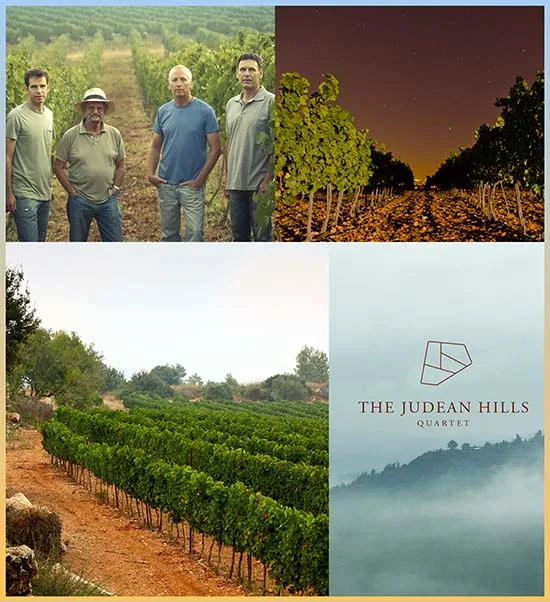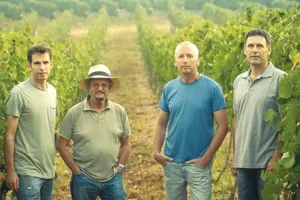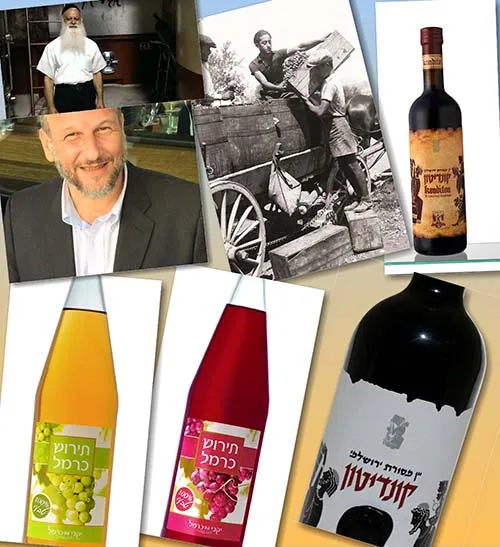The Judean Hills are flowing with wine, echoing the words of Amos the Prophet. Recently, four of Israel’s finest wineries decided to pool their efforts to advance the Judean Hills as a relatively ‘new’ quality wine region, in exactly the same place where wine was made thousands of years ago.
In Biblical times this region was a center of wine production. In those days, people drank far more wine than today, because it was safe, whereas water was a carrier of disease. Vines were grown in terraced vineyards, brought to a nearby ‘gat’ or limestone wine press for fermentation. The resulting wine was put into large amphorae (pointed clay vases with large handles) and then stored in cool caves. The wine was later exported and it was much prized by neighboring countries. Wine was one of the mainstays of the economy.
After the Muslim conquest, the wine industry simply dried up. Of course, individual Jewish families in places like the Old City of Jerusalem continued to make wine at home purely for religious ritual, using food grapes grown by Arabs in Bethlehem and Hebron. However, the once proud industry was laid waste.
The revival of Israeli wine had to wait until the late 1880’s. Then Baron Edmond de Rothschild built wineries and planted vineyards. As far as the Judean Plain was concerned, he planted vineyards in the flatter part of the Shefela, south east of where Tel Aviv is today. It was only in the 1950’s and 1960’s that there was a program to plant vineyards in the rolling hills known as the Judean Foothills. This was encouraged by the Jewish Agency. In the seventies and eighties there were further plantings in the higher elevation Judean Hills. However, these were vineyards to supply the large wineries. The objective in those days was quantity and the word quality did not enter the equation.
In 1988, a restaurateur named Eli Ben Zaken planted a vineyard and produced a wine. He was a Francophile and called his wine Castel Grand Vin and he put Haut Judée on the label, Judean Hills in French. This was a tiny production of a handcrafted wine, but it was the first attempt at quality in the region and the first time the appellation appeared on the label. In 1995 Serena Sutcliffe, MW, Head of the Sotheby’s Wine Department, wrote it was the finest Israeli wine she had ever tasted. With great passion, absolute perfectionism and great attention to detail, Domaine du Castel was born and brought quality to the Judean Hills.
At the same time, a veteran grape grower named Ronnie James, who grew grapes that were sold to the Carmel Cooperative, felt an urge to produce his own wine from his own grapes. In 1993 he founded Tzora Vineyards, and became obsessed with creating a Judean Hills terroir. His charm, smile, and ‘salt of the earth’ character touched and motivated many people.
Almost by example, these two pioneers succeeded in changing the focus of a region. New vineyards were planted, a series of small wineries opened and pursuit of quality became the order of the day. Now the Judean Hills is thriving and one of the most dynamic wine regions in the country.
So, it is not surprising that Castel and Tzora are two of the four wineries. They have been joined by Flam Winery and Sphera, and have called their new consortium The Judean Hills Quartet. Their objective is to spread the message about the Judean Hills, rather in the same way that the Golan Heights Winery did with the Golan a few years ago. They are four of the best.
Domaine du Castel is quite simply the winery that has set the style and quality for Israeli winemakers. They have just moved in to a magnificent new winery at Yad Shmona, near Neve Ilan. Eli Ben Zaken has twice built the most beautiful winery in Israel. That is quite something. The new winery is a real cathedral (or should I say Beit Mikdash) to quality.
Tzora Vineyards has continued to develop since Ronnie James passed away, before his time. One of his last decisions was to bring in a young tousle haired winemaker in 2006. His name was Eran Pick, and he has since become Israel’s most famous winemaker having become Israel’s first ever Master of Wine. He is devoted to making wine from individual plots within the Shoresh vineyard. He is a determined artist with a great deal of talent, drive…and important in the wine business, patience. It is so appropriate and fitting that Tzora’s viticulturist is Dor James, Ronnie’s son.
Flam Winery is the creation of Israel’s most prominent wine family. Two brothers, Golan and Gilad, and their sister, Gefen, founded Flam Winery and they chose to build their beautiful winery in the Judean Hills at Eshtaol. Their father Israel, was the legendary chief winemaker of Carmel, over many years and their mother Kami, runs the finances of the company with an iron grip. It is a true family affair. Golan Flam is the winemaker, who studied in Italy. He is dry, poker faced and silent, until you get into a vineyard where he becomes positively talkative, as though his passion has burst out like a bubbling brook.
Sphera is a winery which has a slogan ‘White Wine Professionals’ and it is devoted to making white wines only. The owner winemaker Doron Rav Hon, who studied in Beaune in Burgundy. A perfectionist whose raison d’être is minimalist, precision and delicateness. Sphera is one of the main white wine pioneers in the country.
Those who follow the most influential wine critics in the wine world, will not be able to ignore the high profile of these Judean Hills wineries. Castel was the first Israeli winery to gain four stars in Hugh Johnson’s Wine Book, and has since been joined by Flam. In Robert Parker’s Wine Advocate, Castel has scored a best for Israel 94 points and is arguably the best performer year in and year out with all their wines achieving high scores. Flam is one of the few Israeli wineries that have scored 93 points. As far as the Wine Spectator is concerned, the highest ever score for an Israeli wine was also by a Judean Hills winery, this time Tzora Vineyards. In addition, all Tzora’s wines scored more than 90 points and one of them featured in the Top 100 Wines of the Year. Finally Stuart Pigott, one of the world’s experts on Riesling, rated the Sphera Riesling as one of the top five in the world.
So, what is special about the Judean Hills The Judean Hills rise from 300 to 900 meters starting in the foothills and rising to the Jerusalem Mountains. The climate is Mediterranean which means warm, dry summers and cold, wet winters. There is usually no rain in the growing season, and the vineyards do not suffer from the humidity of the coastal regions. The region benefits from cooling winds from the Mediterranean Sea, and the cold air circulating from the Jerusalem mountains at night time. The soils tend to be a shallow Terra Rossa on a deep bedrock of limestone. They are well-drained and very rich in minerals. The Judean hills are covered with vineyards, but they tend to be small and varied. This encourages small winery winemaking and there are approximately thirty wineries in the region.
Quite apart from this, the region is beautiful. Pine forests surround the vineyards, limestone rocks lie scattered amongst them, and garrigue, the Mediterranean brush, sprouts close to the ground in clumps. In the spring, wild Mediterranean herbs, like zaater and oregano, mingle with the beautiful wild flowers. If you are lucky, you will see deer frolicking amongst the vines. The viticulturists place of work, is a playground to others! If you look around, you will come across fossils which underline the rich history this land has undergone over millennia.
The most surprising thing is the unusually cold spells that may found in the valleys and corridors of the Judean Hills. When you visit, the winds and temperatures will surprise you.
In wine, the place where grapes are grown is important. That is why a Californian label with Napa Valley on it, will create greater expectation (and cost) than if it was written Central Valley. In Israel, the most famous wine regions for quality are arguably the Golan Heights, Upper Galilee and Judean Hills. This new initiative will help advance the Judean Hills further and introduce it to the general wine world, outside the kosher confines.





